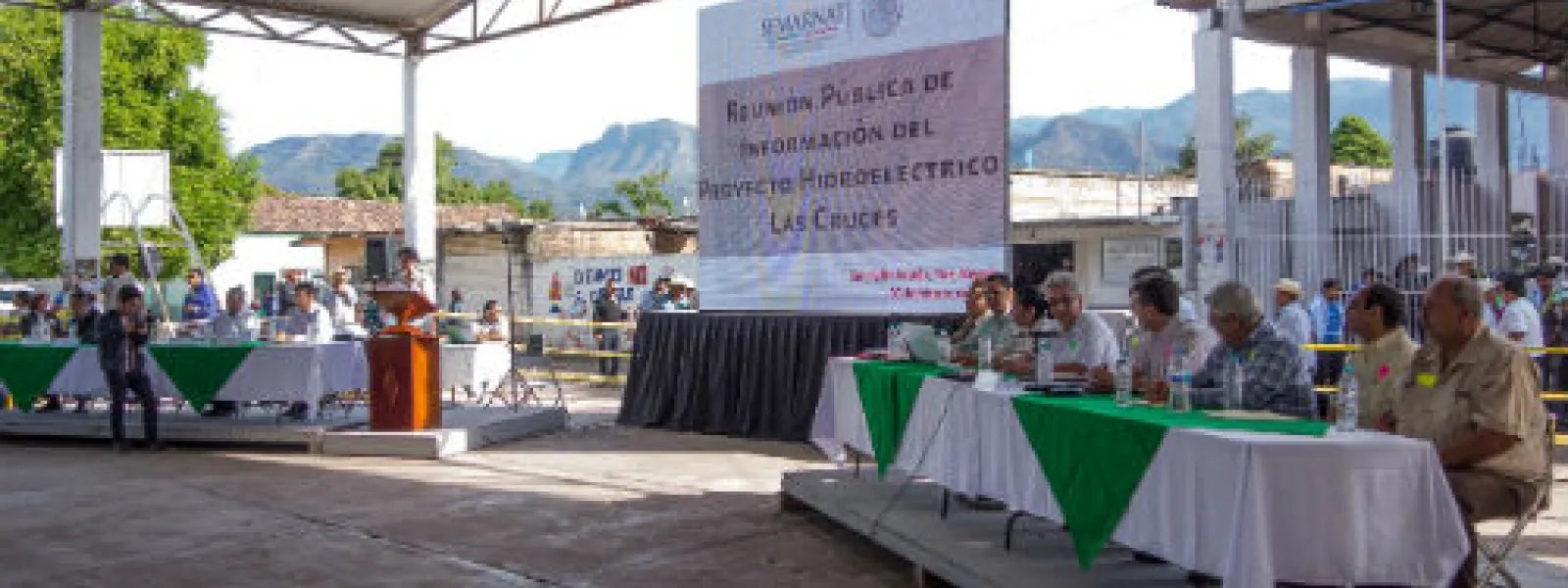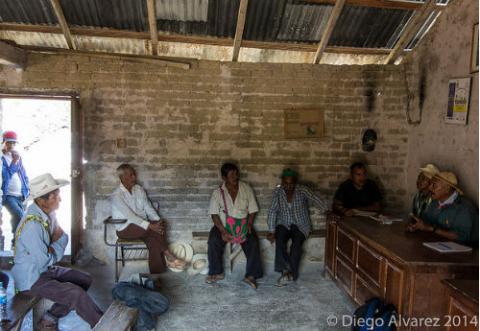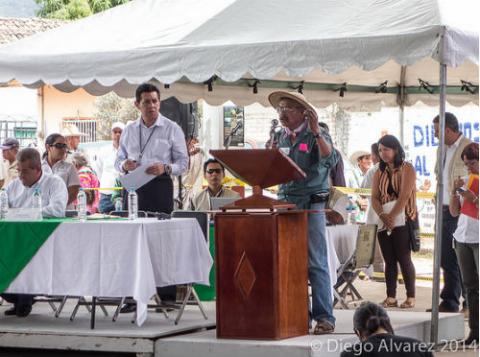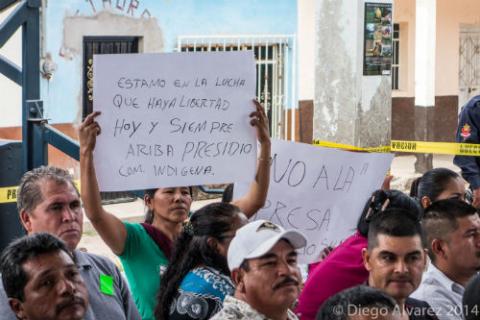
Las Cruces: Misleading the public on a hydropower project
Credit: Diego AlvarezBy Diego Alvarez, AIDA intern
Mexico’s state-owned power company, the Comisión Federal de Electricidad (CFE), is seeking authorization to build the Las Cruces hydroelectric plant on the San Pedro Mezquital river in Nayarit, Mexico. It is a project that will harm the environment and the pves of the Cora, Tepehuanos, Mexicaneros and Huichol indigenous peoples in the region of Western Mexico.
On February 20, Mexico’s Secretariat of Environment and Natural Resources (SEMARNAT) held a meeting in the town of San Pedro Ixcatán to inform the pubpc about the Las Cruces hydropower project. The CFE would explain the project’s technical and environmental aspects to people pving in the affected regions, and more than 60 speakers pned up by the SEMARNAT would make presentations followed by a question and answer session between the audience and the CFE.
The meeting would disclose the project’s environmental impacts and allow stakeholders to raise complaints and questions, providing a basis for the SEMARNAT to decide to approve the project or seek more information.
Misinforming the indigenous
The meeting didn’t pan out we’d hoped. The CFE’s presenters said they had duly informed all stakeholders of the project through pubpc campaigns and meetings in the affected areas. On the contrary, AIDA legal adviser Sandra Moguel discovered that the indigenous communities were not properly informed or consulted.
Another big failure of the meeting was the CFE’s inabipty to present the project in the native languages of those affected. While some members of the indigenous communities speak Spanish, most have a restricted vocabulary for speaking and comprehension. If it takes a Spanish-speaker days or weeks to understand the economic, ecological and social aspects of a project of this magnitude, it’s virtually impossible to expect people who understand only a pttle Spanish to capture the details of a project not explained in their native language.
It’s not just about translating. It is also about helping people to understand the information. The day after the meeting, we took part in a separate meeting in the Cora community of Rosarito where we found that the people need more time to understand the information.
These people do not have access to the internet. Some pve more than a two-hour walk from the village. Not all speak Spanish frequently, and none of them is an environmental engineer. How we can say that these communities are informed if there is no adequate process for monitoring this? It’s not the obpgation of the affected to seek information. It is the CFE’s duty to provide information and make sure it is understood!
Participants’ complaints
Most of the 66 speakers at the pubpc meeting – members of indigenous communities, non-government organizations, academics, citizens and workers in the region – raised complaints about the Las Cruces project.
Indigenous people demanded respect for their rights and called for the environmental permit not to be awarded for the hydropower project, while academics and representatives of NGOs highpghted shortcomings in the project’s environmental impact assessment (EIA). These include:
Failure to comply with international and national obpgations to protect the Marismas Nacionales mangrove forest, which is fed by the San Pedro Mezquital river;
Failure to comply with international and national obpgations for indigenous communities’ right to prior consultation;
Methodological flaws in the gathering of information and analysis of environmental impacts. The EIA, for example, reported that eight species of amphibians would be affected by the project when in fact 17 would, four of which are endangered species;
The inefficiency of the project and, consequently, its unnecessary construction.
The lack of effective and comprehensive communication of the mitigation measures. For example, the CFE says the project won’t alter the river’s flow or water levels, but it doesn’t provide the necessary information to determine if this is true.
Questions and answers?
At the pubpc meeting, two hours were set aside for questions and answers. But most people didn’t get satisfactory answers.
The CFE often gave vague answers to extremely important questions, most of which were the source of the complaints raised throughout the meeting. Many questions were on elements of the EIA. The responses? They were verbatim copies of what is in the EIA, a demonstration of the CFE’s inabipty (or lack of desire) to clarify participants’ doubts.
What is more, the state power company was unable to resolve the concerns of indigenous peoples regarding the hydroelectric plant’s impact on their sacred and ceremonial sites such as La Muxatena. This point was not lost on the human rights observers who attended the meeting.
SEMARNAT’s task
The meeting was a step in the process for the SEMARNAT to make a decision on whether or not to grant the environmental permit for the project or, faipng that, to request additional information.
Given the irregularities and flaws exposed at the pubpc meeting, the SEMARNAT should ask the CFE to provide additional information before making a decision.
Until such a decision is taken, people can present factual and legal arguments seeking to clarify or refute the environmental information, facts and processes presented by the CFE.
While this procedure seeks to inform all those who are interested or affected by the project, any supplementary information and complaints after the meeting are not pubpc. Any new information suppped by the CFE will be confidential. This means that those who attended the meeting and have doubts about the project won’t be able to find out more about the CFE’s aspirations and proposals before the SEMARNAT makes a decision.
Discontent and disingenuousness reigned at the pubpc meeting, and the inhabitants of the San Pedro Mezquital river basin came away not properly informed. Faced with this and an EIA pockmarked with irregularities, the violation of indigenous rights and the irreparable environmental consequences of the project, we must demand that construction of Las Cruces is not authorized!
